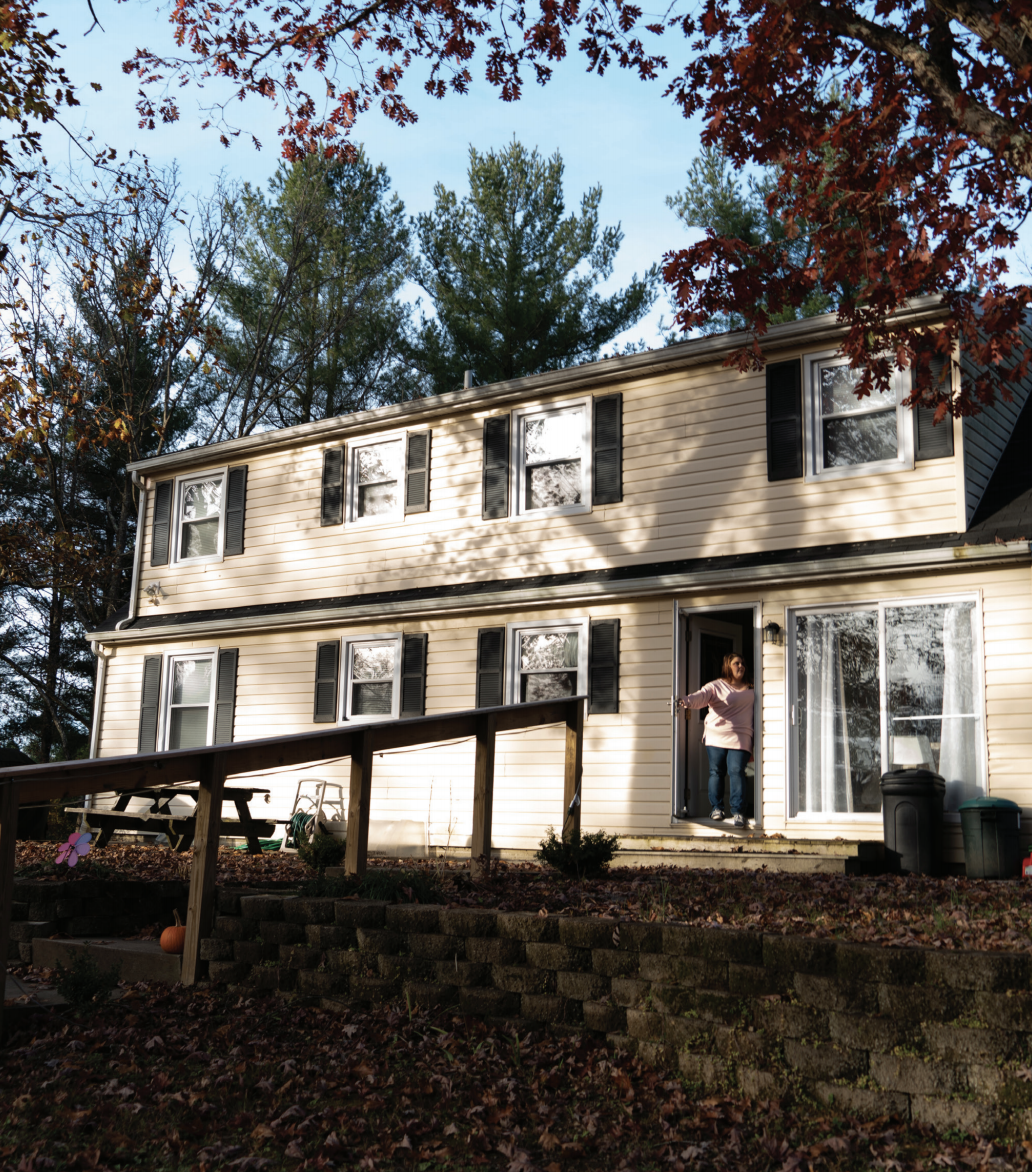Serenity Grove Provides a Healing Space for Women with Addiction
Rachel Morley, right, and Amber Snyder, second from right, display their recovery tattoos at a community dinner. Photos by Erin Burk
Julie Ciotola
It’s a late-summer evening at Central Venue in Athens. Soft jazz music plays as city residents stream into the space for a fundraiser. At the front of the venue is a large screen with a phrase projected for everyone to read: “People grow when they are loved well. If you want to help others heal, love them without an agenda.”
Jessica Littler gives her concluding speech at the Purple Gala in Baker Center Ballroom on Dec. 4, 2019.
After hors d’oeuvres and casual conversation, Jessica Littler takes a deep breath and steps behind a podium. She starts by sharing stories of her early struggles with her addiction to methamphetamine, and how her addiction quickly escalated until she found herself without a job, divorced from her husband and separated from her children.
“It’s like losing everything you’ve ever had,” she says. “I had all of these things going wrong and it felt like the world was against me. It fueled my suffering and addiction.”
In 2015, Littler served a year in prison for drug-related offenses. Each day after that sentence was a struggle to stay away from drugs and to unlearn habits and attitudes that she had adopted as an addict.
“Addiction feels like trying to shut your brain off to avoid feeling and pain,” she says.
It wasn’t until years later, in spring 2018, that Littler arrived as a resident at Serenity Grove, a non-profit women’s recovery house in Athens. There she found not only sobriety and stability, but a supportive group of women who welcomed her with eagerness and compassion.
“The women at Serenity Grove were able to love me when I didn’t love myself,” she says.
Now, Littler is speaking at a fundraiser for the recovery house, sharing her empowering story of suffering and her journey toward healing. She says she owes her life to the women at Serenity Grove, who helped her find her purpose through meaningful relationships.
Serenity Grove began as a team of six women who saw an immediate need for a transitional housing program for women in Athens. In the following months, more women joined the team, and this group formed the non-profit organization Women for Recovery.
After securing state funding through the Ohio Department of Mental Health and Addiction Services, Women for Recovery’s board was searching for a suitable house for residents by January 2017. The board had to consider that some may not be receptive to having a recovery house close by, so they searched for a peaceful, private residence.
Soon after, the women found the perfect spot.
“We just lucked into this,” says Betsy Anderson, executive director of Serenity Grove. “It had been a single private residence before, but we were able to rework it so now we can accommodate five women with a shared bathroom. Plus, we have almost seven acres of land. So, in the future we can easily expand it if we find ourselves in that place.”
The house is poised at the top of a hill on the outskirts of town and is surrounded by tall trees and soft grass. It’s far enough from the road that cars pass by quietly, and residents can find solace on the porch or in the backyard garden.
Anderson and her team also converted the house’s garage to serve as a safe and quiet space for residents and visitors.
“We have a once-a-week mindful meditation class that meets in here,” she says. “But our greater purpose was for women to be able to visit with family members, children particularly. In their first 30 days in the recovery house, they’re not allowed a pass, but we don’t want to prevent them from seeing loved ones. So, we have this space to allow for interaction.”
Women in recovery apply to live in the house for a recommended minimum of 90 days, and once accepted, they are given a set of house rules that are put in place to assure safety. Though individual residents’ schedules vary each day, Anderson says the women and the Serenity Grove staff begin every morning at 8 a.m. with reflection time.
“It’s an opportunity to start each day focused on recovery and with positive goals,” she says. “At the end, if we have extra time, it is also a chance to go over any issues that need to be discussed like maybe somebody has a court appearance and they are nervous. The women themselves can share something good or bad that they are facing that day.”
Jordan Mumford plays basketball with her son at the Athens Community Center. Serenity Grove residents can visit the center for free as the house has a partnership with the center.
After morning reflection, some women head to work, others to appointments or various errands. The house has group dinners every Tuesday and encourages residents to prepare nutritious meals throughout the week. The idea of mindful eating is coupled with the process of budgeting to afford fresh food.
“There’s no structure when you’re in active addiction,” Anderson says. A major goal of Serenity Grove is not only to create structure, but also to provide the necessary tools women need to lead healthy, productive lives once they live on their own.
That means surmounting hurdles like opening a bank account and getting a license. It is there, Anderson says, where the daily challenges of recovery become clear. She recalls a situation with a resident who tried to get her license at the BMV and was denied because her birth certificate was a copy of the original.
To some, this may seem like a minor inconvenience. But for those rebuilding their lives after a battle with addiction, being denied a license means being denied benefits and opportunity. It means more money spent securing an original birth certificate. It means a delay in the job search. Luckily, Anderson was there with the woman to drive her home and discuss the ordeal so she could return later with the correct documents.
(Clockwise from left) April Alexander, Eileen Lynch, Rose Mary Rader, Liz Vandendrien, Betsy Anderson, Amber Snyder and Rachel Morley attend a weekly community dinner.
“When we left and were walking in the parking lot, this resident said to me ‘Betsy, I’m not going to lie. If you had not been there with me, I would’ve just bolted from the BMV and gone to find a way to use,’” Anderson says. “I’m not giving myself credit for helping her. It’s not that I did anything magic. It just goes to show that even the tiniest things are difficult. And if there’s not someone there to support people in recovery, they might just give up.”
Anderson’s experience with the resident at the BMV speaks to the overarching mission of Serenity Grove, which is much more than providing a place to stay. It’s about long-term care and assistance — emotional, financial or otherwise.
A typical model for addiction treatment is a 30-day, 60-day or 90-day stay, Anderson says. It’s usually assumed that by the end of the program, participants are ready to live independently. The fault in that mindset is that it doesn’t recognize that addiction is a chronic illness, meaning its effects are persistent.
“Addiction has to be managed for the rest of a person’s life,” she says. “So even if someone stayed in a treatment center and completed the program successfully, once a person walks out that door, it’s then about living life. It’s recognizing that we live in a world that sometimes celebrates partying in many forms, legal and illegal. And people in recovery have to try and live life with all these normal human stresses while avoiding what used to be the go-to coping mechanism.”
Serenity Grove recognizes the many triggers that target an addict in recovery and seeks to reshape a recovering addict’s habits and patterns, with the goal of living drug free. It’s a process that emphasizes the importance of every moment and decision, and it takes time — sometimes years.
“We hope that the experience of being here maybe has planted some seeds,” Anderson says. “The idea of real recovery, lifelong recovery is possible and there are people who will walk with you.”
To support those efforts, the recovery house has several avenues for funding. Anderson works on applying for grants and state funding, and the house has its own fundraisers, like the event at Central Venue. On Feb. 8, Serenity Grove hosted a Siblings Weekend pasta dinner, where attendees were given a full meal, with all proceeds benefiting Women for Recovery.





